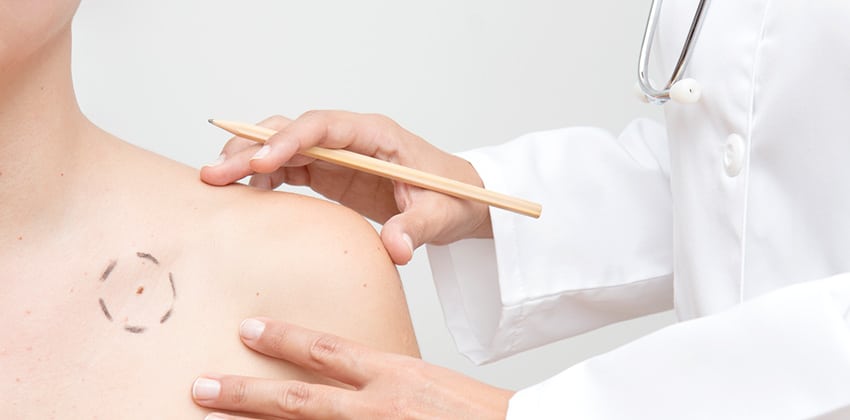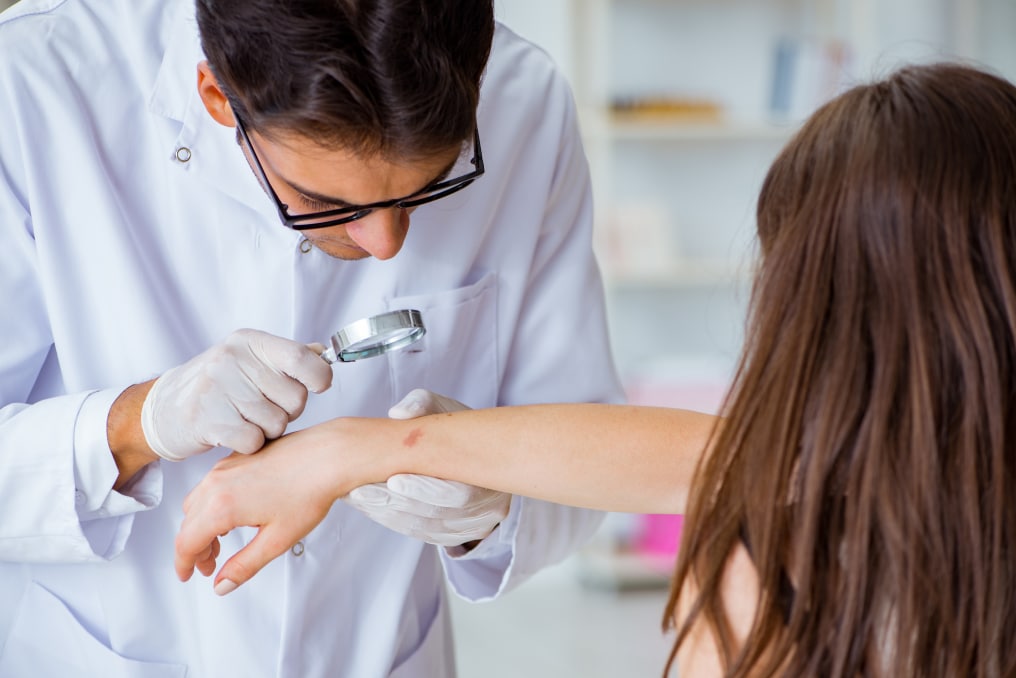Suspicious Lesion in Naples & Fort Myers, FL

Skin cancers — including melanoma, basal cell carcinoma, and squamous cell carcinoma — often start as changes to your skin. They can be new growths or precancerous lesions — changes that are not cancer but could become cancer over time. An estimated 40% to 50% of fair-skinned people who live to be 65 will develop at least one skin cancer. Learn to spot the early warning signs. Skin cancer can be cured if it’s found and treated early.
One of our services at Harris Dermatology is detecting suspicious lesions in the skin. If our doctors find an area that looks potentially harmful, we’ll need to monitor it closely. We will put you on a follow-up program to check on that area and catch any potential cancer early in its progression.
How Do I Know if a Mole Is Suspicious?
Skin cancer often gives us visible warning signs that can help with early detection. One of these signs is an irregular mole. When performing self-checks, keep the ABCDE rule in mind.
If your mole has any of the following signs, you should have it checked by our board-certified dermatologists:
- Asymmetry: One part of the mole doesn’t match the other.
- Irregular Border: Your mole has irregular, scalloped, or blurred edges.
- Varying Color: The color of your mole isn’t uniform and contains several shades of brown, black, pink, white, red, or blue.
- Large Diameter: The spot is larger than your other moles and about the size of a pencil eraser.
- Evolving: Your mole is changing color, shape, or size.
While most moles are benign, be sure to have any spots with these suspicious symptoms examined during your skin cancer screening and removed as needed. Additional warning signs of skin cancer include itchiness, tenderness, swelling beyond the border of your mole, oozing, bleeding, or a sore that won’t heal.
What Conditions Can Be Mistaken for Skin Cancer?
At Harris Dermatology, we often see patients who fear they have skin cancer, but it is actually a minor or harmless condition. For example, seborrheic keratosis is a benign tumor frequently mistaken for cancer since it looks similar to an irregular mole. Similarly, cherry angiomas can look like suspicious skin lesions, but these bright red bumps on the skin are typical in patients over 40 years old and are caused by an overgrowth of blood vessels.

Other conditions, like psoriasis, cause uncomfortable, dry, scaly patches of skin, which you may think is skin cancer. We can often manage psoriasis through light therapy, topical treatments, and oral medications, and it is not life-threatening.
Actinic Keratosis vs. Skin Cancer
Actinic keratosis, or solar keratosis, is one of the most common suspicious lesions our practice sees. Only about 10% of actinic keratosis becomes cancerous, but of that, most cancers that develop are squamous cell carcinoma.
Fortunately, with minimally invasive treatments like cryotherapy, chemical peels, and laser therapy, most actinic keratosis can be removed with virtually no downtime. If you notice these scaly tan, light pink, or brown patches, book a dermatologist appointment with our Naples or Fort Meyers, Florida, providers to find out more about your removal options.
How Do Dermatologists Remove Suspicious Lesions?
If our dermatologists believe your suspicious skin lesion is cancerous or precancerous, we’ll recommend prompt treatment. Thanks to advanced technologies and surgical techniques, removal is easier than ever.
Some options for treating suspicious lesions include:
- Shave excision: Our dermatologist will use a small blade to shave away the outermost layers of the skin and remove the lesion. This technique may not require any stitches.
- Simple scissor excision: This technique can also be used on more superficial skin lesions. Our dermatologists will carefully remove the lesion with curved surgical scissors during this excision.
- Curettage and electrodesiccation: This superficial removal technique involves scraping or cutting out a skin lesion and using an electrical current to clear the area further.
- Skin excision: If the lesion has grown into deeper layers of the skin, we can remove the tumor and some surrounding tissue to ensure clear margins before closing the area with stitches.
- Laser excision: Laser or light therapy treatments heat the skin lesion until it’s destroyed.
- Cryotherapy: This works similarly to laser excision but freezes the tissue to eliminate it.
- Mohs surgery: If we diagnose your lesion as cancer, this skin-sparing technique removes thin layers of tissue and tests them until only healthy skin remains.
Each skin lesion excision method is typically performed under local anesthesia and requires little to no downtime.
Why Choose Harris Dermatology?
You'll find a unique blend of expertise and personalized care at Harris Dermatology. The Harris brothers, Dr. Brian A. Harris, Dr. Keith A. Harris, and Dr. H. Ross Harris, are board-certified dermatologists who grew up in Fort Myers and are deeply committed to serving Southwest Florida. They founded Harris Dermatology to create a practice focused on skin cancer detection, treatment, and prevention of skin cancer.
Our state-of-the-art facilities in Fort Myers and Naples provide a comfortable and welcoming environment led by our caring and highly-trained team. The combination of dedicated physicians, advanced technology, and comprehensive treatment options ensures you’ll receive the highest quality care.
Frequently Asked Questions
Can a Suspicious Lesion Go Away on Its Own?
While rare, some suspicious lesions like actinic keratosis can regress without treatment. However, this is not common, and you should have any suspicious lesion evaluated by a dermatologist to make sure it’s not cancerous.
How Often Should I Check My Skin for Suspicious Lesions?
You should conduct a monthly self-exam to look for new or changing lesions. We also recommend having an annual professional skin cancer screening for a thorough evaluation.
Can Sunscreen Prevent Lesions?
You can significantly reduce your risk of developing lesions and skin cancer by using sunscreen to protect your skin from harmful UV rays. Despite this, you should still schedule regular screenings for early detection.
Is Family History a Significant Risk Factor for Suspicious Lesions?
Yes, having a family history of skin cancer increases your risk, especially if immediate relatives have had melanoma. Discussing this with your dermatologist can help guide appropriate screening measures.
Does the Location of a Lesion Matter?
Yes, lesions located in sun-exposed areas such as the face, neck, and hands should be examined carefully because these are more prone to becoming cancerous.
What Happens if My Lesion Turns Out to Be Benign?
If a suspicious lesion is benign, your dermatologist will decide whether to remove it or just monitor it based on its characteristics, location, and potential to change over time.
Are Suspicious Lesions Painful?
Most suspicious lesions are painless. However, if you experience pain, tenderness, itching, or bleeding, you should have them evaluated to rule out more serious conditions.
What Should I Avoid After Having a Lesion Removed?
Avoid direct sun exposure on the treated area and follow your dermatologist’s specific care instructions. This will ensure proper healing and minimize scarring.
How Long Does It Take to Recover From Lesion Removal?
Recovery time depends on the removal method. Many procedures have little to no downtime, with most patients experiencing complete healing within a few weeks. We’ll provide detailed aftercare instructions.
Are Suspicious Lesions Always Visible?
Not always. Some suspicious lesions are tiny and can easily be missed, which makes professional screenings even more vital for early detection and accurate diagnosis.
Book a Skin Cancer Screening for Your Suspicious Lesions
If you have noticed suspicious lesions on your body and are worried about the potential implications, please be sure to schedule a skin cancer screening appointment at one of our two Florida offices. Call (239) 936-3344 for our Fort Myers office, or (239) 596-1848 for our Naples office. You can also fill out the Appointment Request Form on this page. Our top dermatologists looks forward to serving you!

